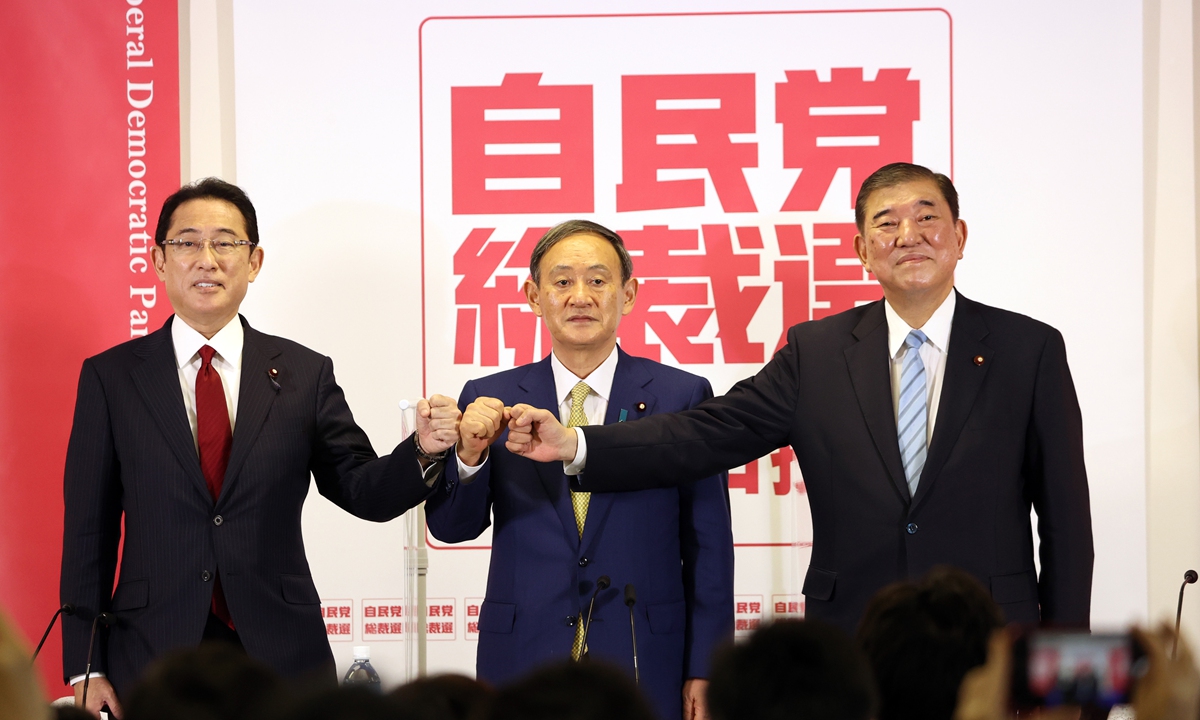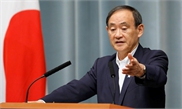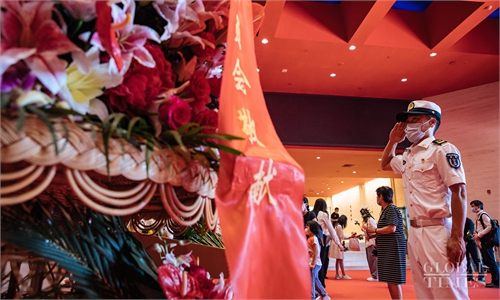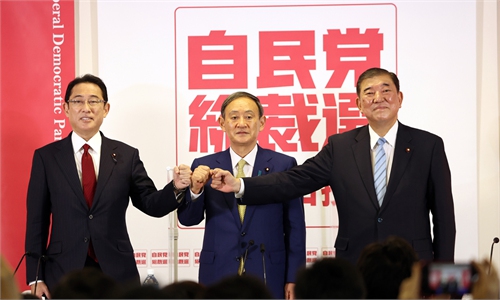China-Japan ties 'uncertain' in post-Abe era
New PM will mostly keep predecessor's foreign affairs legacy: expert

Japan's ruling Liberal Democratic Party leadership candidates Japan's Chief Cabinet Secretary Yoshihide Suga (center), former defence minister Shigeru Ishiba (right), and former foreign minister Fumio Kishida pose for photographs during a news conference in Tokyo on Tuesday. Photo: AFP
The Liberal Democratic Party (LDP) of Japan will elect its new leader on Monday who will also essentially succeed the resigned Shinzo Abe as the country's prime minister, but as rising hard-line attitudes toward China bring uncertainty to China-Japan ties, Chinese analysts warned that a worsening bilateral relationship will bring visible harm to Japan.
China will handle the impact according to the change in the international situation, and Japan's new leader is not expected to abandon the benefits that have been achieved under the cooperation of the two countries in the past few years, Chinese experts said. The hostile remarks by the candidates for LDP president are likely just a show to please conservative and pro-US forces in the party to win their support, so to what extent there will be a challenge to China's core interests after the new LDP leader is voted in remains uncertain.
The three candidates who are vying to be Abe's successor are Chief Cabinet Secretary Yoshihide Suga, who has been Abe's right-hand man for almost eight years, Shigeru Ishiba, a former defense minister and a rare critic of Abe within the LDP, and Fumio Kishida, LDP's policy chief and former foreign minister.
Suga promised on Saturday to stand his ground with Beijing, saying he will not be afraid to express Japan's claims to China should he become prime minister, according to Japanese media the Nikkei Asian Review.
"If there are assertions that should be made, I will make those assertions at high-level talks," the frontrunner among the candidates for the new Japanese leadership said about China-Japan relations during a debate with his two rivals for the presidency of Japan's ruling political party, Fumio Kishida and Shigeru Ishiba.
The event at the Japan National Press Club in Tokyo comes ahead of Monday's election to decide the next president of the LDP. Since the LDP-led coalition controls both houses of parliament, which elect the prime minister, the next leader of the party will also succeed Prime Minister Abe, who announced his resignation last month over health reasons.
Suga's main rival Ishiba was even more radical and hawkish on China during the Saturday debate. According to Taiwan media can.com, Ishiba claimed that China's Diaoyu Islands are "Japan's inherent territory" and said that China's recent policy on Hong Kong will affect Taiwan, and Japan must not "sit and watch it happen."
Da Zhigang, director and research fellow of the Institute of Northeast Asian Studies at the Heilongjiang Provincial Academy of Social Sciences and chief expert at the Northeast Asian Strategic Studies Institute, said the candidates' tough stance on China does not necessarily lead to a dead end in China-Japan ties, despite "the pandemic having shed light on some risks."
"Japan will not completely abandon the collaborations that have been previously negotiated, especially on the economy and trade," he said.
Lü Yaodong, director of the Chinese Academy of Social Sciences' Institute of Japanese Studies, told the Global Times that some of their tough rhetoric was campaigning for the election. "We'll have to review their policies after the election. Suga, for example, claimed that he will inherit Abe's domestic and foreign policy. But we can only know when he takes office."
Before announcing his resignation, Abe was making efforts to realize a trilateral cooperation deal with China and South Korea to boost post-pandemic resumption and economic recovery for Northeast Asia, but due to the worsening ties with South Korea and China on top of interruptions from the US, Japan would be unlikely to continue on with the deal. This will be a loss for Japan and the region, analysts said.
Lü noted that in the long run, there will always be problems between China and Japan. "But we should sit down and negotiate with each other, taking into account the changes in different historical periods, and then take joint measures to improve China-Japan relations," he said.
"China will also adopt different strategies to respond in accordance with the changing situation of the international arena," Lü noted, which will include the result of the US election.
"On the one hand, China will retaliate against Japan if it makes provocations in the future," Da told the Global Times. "On the other, China will release friendly signals to encourage Japan to boost win-win cooperation."
"China will do what's better for the grand picture of China-Japan relations, but there is no room for negotiation and compromise when it comes to core national interests," such as sovereignty issues on the Diaoyu Islands, Hong Kong and Taiwan, Da said.
Although the three candidates all hold a hard-line stance, they still want Japan to play a special role in the international arena to mediate between the two major powers in tension - China and the US.
At the debate, Ishiba said if the US had cooperated with China at the beginning of the COVID-19 pandemic, things would be much better, but Japan has a role to play in shaping a world with China-US cooperation, cna.com reported.
If Japan can really provide such assistance, it would surely be welcomed by China, but unfortunately, Japan is not a real independent country that is able to mediate between the two most powerful countries on the planet. It is only Washington's loyal follower which still has huge US military presence, Chinese experts said.




